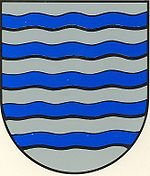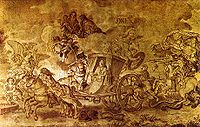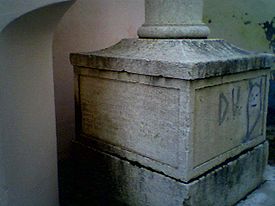
Távora affair
Encyclopedia

Portugal
Portugal , officially the Portuguese Republic is a country situated in southwestern Europe on the Iberian Peninsula. Portugal is the westernmost country of Europe, and is bordered by the Atlantic Ocean to the West and South and by Spain to the North and East. The Atlantic archipelagos of the...
court. The events triggered by the attempted murder of King Joseph I of Portugal in 1758 ended with the public execution of the entire Távora family and its closest relatives in 1759. Some historians interpret the whole affair as an attempt by the prime minister Sebastião de Melo (later Marquis of Pombal) to limit the growing powers of the old aristocratic families.
Prelude
In the aftermath of the Lisbon earthquake1755 Lisbon earthquake
The 1755 Lisbon earthquake, also known as the Great Lisbon Earthquake, was a megathrust earthquake that took place on Saturday 1 November 1755, at around 9:40 in the morning. The earthquake was followed by fires and a tsunami, which almost totally destroyed Lisbon in the Kingdom of Portugal, and...
on November 1, 1755, which destroyed the royal palace, King Joseph I of Portugal took up residence in a huge complex of tents and barracks in Ajuda, on the outskirts of the city. This was the centre of Portuguese political and social life. The king lived surrounded by his staff, led by the prime minister, Sebastião José de Carvalho e Melo, and was attended by his peers, the Portuguese high nobility.
The prime minister was a strict man, son of a country squire, with a grudge against the old nobility, who despised him. Clashes between them were frequent and tolerated by the king, who trusted Sebastião de Melo for his competent leadership after the earthquake.
King Joseph I was married to Mariana Vitoria of Borbón, princess of Spain
Spain
Spain , officially the Kingdom of Spain languages]] under the European Charter for Regional or Minority Languages. In each of these, Spain's official name is as follows:;;;;;;), is a country and member state of the European Union located in southwestern Europe on the Iberian Peninsula...
, and had four daughters. Despite an attested happy family life (the king loved his daughters and enjoyed playing with them and taking them on nature walks), Joseph I had a favourite mistress: Teresa Leonor, wife of Luis Bernardo, heir of the Távora family.
Luis Bernardo's parents, Marchioness
Marquis of Tavora
Count of São João da Pesqueira was a Portuguese title of nobility created by a royal decree, dated from 21 March 1611, by King Philip II of Portugal , and granted to Dom Luís Álvares de Távora, Lord of Távora.In the 17th century this family received new honours: a royal decree of King Afonso VI of...
Leonor of Távora and her husband, Francisco Assis, Count of Alvor
Count of Alvor
Count of Alvor was a Portuguese title of nobility granted by king Peter II of Portugal in 4 February 1683, to Francisco de Távora, second son of António Luís de Távora, 2nd Count of São João da Pesqueira....
and former viceroy of India, headed one of the most powerful families in the kingdom. They were related to the houses of Aveiro
Duke of Aveiro
The Royal Dukedom of Aveiro was an aristocratic Portuguese title, granted in 1535 by King John III of Portugal to his 4th cousin, John of Lencastre, son of Infante George of Lencastre, a natural son of King John II of Portugal....
, Cadaval
Duke of Cadaval
The Dukes of Cadaval have their origins in Álvaro of Braganza, Lord of Tentúgal, Póvoa, Buarcos and Cadaval, 4th male son of Ferdinand I, 2nd Duke of Braganza. Dom Álvaro married Dona Phillipa of Melo, the rich daughter and heir of Rodrigo of Melo, 1st...
and Alorna
Marquis of Alorna
Marquis of Alorna was a Portuguese title of nobility granted, in 9 November 1748, by King John V of Portugal, to D. Pedro Miguel de Almeida Portugal e Vasconcelos, 3rd Count of Assumar and 44th viceroy of India....
. They were also among the bitterest enemies of Sebastião de Melo. Leonor of Távora was politically influential, preoccupied with the affairs of the kingdom handed to, from her perspective, an upstart with no education. She was also a devout Catholic with strong ties to the Jesuits, including her personal confessor
Confessor
-Confessor of the Faith:Its oldest use is to indicate a saint who has suffered persecution and torture for the faith, but not to the point of death. The term is still used in this way in the East. In Latin Christianity it has come to signify any saint, as well as those who have been declared...
, Gabriel Malagrida
Gabriel Malagrida
Gabriel Malagrida was an Italian Jesuit missionary in Brazil and influential figure in the political life of the Lisbon Royal Court who described the devastating 1755 Lisbon earthquake as retribution prompted by God's wrath.Malagrida was famously caught up in the Távora affair and executed as a...
.
Assassination attempt

Sebastião de Melo took control of the situation. Concealing the attack and the king's injuries, he initiated a swift enquiry. A few days later two men were arrested for the shootings and tortured. The men confessed their guilt and stated that they were following the orders of the Távora family, who were plotting to put the Duke of Aveiro on the throne. Both men were hanged the following day, even before the attempted regicide
Regicide
The broad definition of regicide is the deliberate killing of a monarch, or the person responsible for the killing of a monarch. In a narrower sense, in the British tradition, it refers to the judicial execution of a king after a trial...
was made public.
Arrests, trial and sentence
In the following weeks the Marchioness Leonor of Távora, her husband the Count of AlvorCount of Alvor
Count of Alvor was a Portuguese title of nobility granted by king Peter II of Portugal in 4 February 1683, to Francisco de Távora, second son of António Luís de Távora, 2nd Count of São João da Pesqueira....
, and all of their sons, daughters and grandchildren were imprisoned. Alleged conspirators, the Duke of Aveiro and the Távoras' sons-in-law, the Marquis of Alorna
Marquis of Alorna
Marquis of Alorna was a Portuguese title of nobility granted, in 9 November 1748, by King John V of Portugal, to D. Pedro Miguel de Almeida Portugal e Vasconcelos, 3rd Count of Assumar and 44th viceroy of India....
and the Count of Atouguia
Count of Atouguia
Count of Atouguia was a Portuguese title of nobility created by a royal decree, dated from 17 December 1448, by King Afonso V of Portugal, and granted to D. Álvaro Gonçalves de Ataíde....
, were arrested with their families. Gabriel Malagrida, the Jesuit confessor of Leonor of Távora, was also arrested.
All were accused of high treason and attempted regicide. The evidence presented in their common trial was simple: a) the confessions of the executed assassins; b) the murder weapon belonging to the Duke of Aveiro; and c) the assumption that only the Távoras would have known the whereabouts of the king on that evening, since he was returning from a liaison with Teresa of Távora (who was also arrested).

Salting the earth
Salting the earth, or sowing with salt, is the ritual of spreading salt on conquered cities to symbolize a curse on its re-inhabitation. It originated as a practice in the ancient Near East and became a well-established folkloric motif in the Middle Ages.-Destroying cities:The custom of purifying...
, their name erased from the peerage and their coat-of-arms outlawed.
The original sentence ordered execution of entire families, including women and children. Only the intervention of Queen Mariana
Mariana Victoria of Spain
Mariana Victoria of Spain was an Infanta of Spain and Queen consort of Portugal as wife of King Joseph I. The mother of Queen Maria I of Portugal, she also acted as Regent of Portugal during the last months of her husband's life and advisor to her daughter during her reign.-Background:Mariana...
and Maria Francisca
Maria I of Portugal
Maria I was Queen regnant of Portugal and the Algarves from 1777 until her death. Known as Maria the Pious , or Maria the Mad , she was the first undisputed Queen regnant of Portugal...
, heiress to the throne, saved most of them.
The Marchioness, however, was not spared. She and the other defendants sentenced to death were publicly tortured and executed on January 13, 1759, in a field near Lisbon. The king was present with his bewildered court. The Távoras were their peers and kin, but the prime minister wanted the lesson driven home.
Afterwards the ground was salted, to prevent future growth of vegetation. To this day the field is a square in Lisbon called Terreiro Salgado ("the salty ground"); on its corner stands a shame memorial with an inscription just below waist height, overlooked by no saints' statues on niches - this disposition effectively converted the memorial into a popular pissoir.
Aftermath
Gabriel Malagrida was burned at the stake a few days later and the Jesuit Order outlawed. All its estates were confiscated and all Jesuits expelled from Portuguese territory, both in Europe and the colonies.The Alorna family and the daughters of the Duke of Aveiro were sentenced to life imprisonment in various monasteries and convents.
Sebastião de Melo was made Count of Oeiras for his competent handling of the affair, and later, in 1770, was promoted to Marquis of Pombal, the name by which he is known today.
Discussion
The guilt or innocence of the Távoras is still debated today by Portuguese historians. On the one hand, the tense relations between the aristocracy and the king are well documented. The lack of a male heir to the throne displeased most of them and, indeed, the Duke of Aveiro was a possible candidate for succession.On the other hand, some refer to a convenient coincidence: with the conviction of the Távoras and the Jesuits, all enemies of Sebastião de Melo disappeared and the nobility were tamed. Moreover, the Távoras' defenders argue that the attempted murder of Joseph I might have been a random attack by highway robbers, since the king was traveling without guard or sign of rank on a dangerous Lisbon road. Another clue to possible innocence is the fact that none of the Távoras or their allies tried to escape from Portugal in the days following the attack.
See also
- A-dos-RuivosA-dos-ruivosA-dos-Ruivos is a village located in near Carvalhal, at Bombarral, Portugal. It has a population of 196 inhabitants.This Portuguese village was portrayed by the writer Júlio César Machado in his book "Serões na Aldeia". He owned a house there...
— The village where the Távora family took refuge when they were being persecuted by the Marquis of Pombal. - The Távora family Genealogical tree

